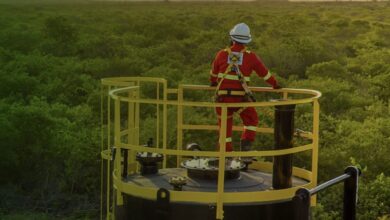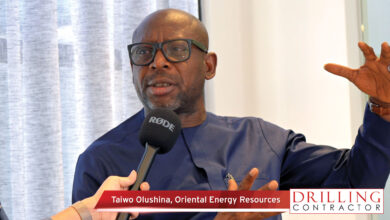Wicklund: Scale matters, and drilling industry needs more consolidation
By Linda Hsieh, Managing Editor
The global drilling industry is on the road to recovery, even if the recovery isn’t quite here yet for every segment of the market, Jim Wicklund, Managing Director, Energy, for Credit Suisse, said at the 2018 IADC Annual General Meeting on 9 November in New Orleans. In the meantime, he urged the industry to look more toward consolidation.
Onshore North America, the recovery has arrived, with the US rig count up by 300% over the past 2.5 years, Mr Wicklund noted. He forecasts that the rig count will resume its march upwards next year, especially once pipeline capacity is added to increase takeaway capacity in the Permian. In particular, super-spec rigs – featuring greater horsepower, higher pressure rating, more hookload and expanded pipe-racking capacity – remain in high demand across all unconventional plays.

“The reason the rig count hasn’t gone down with what’s going on in the Permian is every oil company knows that if they give up their super-spec rig and try to get it back in nine months, they won’t,” Mr Wicklund said. “So they’ll continue to drill and put DUCs (drilled but uncompleted wells) into the inventory, and sometime in the next year or two we’ll start completing those.”
He added that dayrates for land rigs remain in the low to mid-$20,000 range, and contractors are now moving forward with $10 million to $15 million investment to refurbish older rigs. There’s even talk about building new rigs for the US market, he said, although that might not happen for a couple more years. “The Permian basin is expected to be 65% of global oil production growth for the next two years… Barring a global recession, you’re going to see onshore US activity pick up early in the year but really meaningfully in the second half of the year, and go on for a while.”
Looking at offshore, Mr Wicklund noted that several companies in the jackup market are already starting to see earnings revisions going up. “Investors are noticing that,” he said. “And the deepwater market is actually one of the best-performing sub-sectors in terms of stocks because of the anticipation that next year is going to be ‘the’ year,” he said, noting that he believes that deepwater activity and dayrates won’t really start to improve until 2020.
Mr Wicklund also emphasized that, from a stock market point of view, the drilling industry should move toward more consolidation – much as Ensco and Rowan Companies are doing. “There are no investors left today to buy a $500 million or $1 billion or $1.5 billion market-cap company. The Fidelities, the Vanguards, the State Streets, the Capital Guardians of the world don’t buy those small-cap stocks,” he said. “One way for this industry to end up surviving from a stock perspective, as well as from an operational perspective, is scale.
“Scale matters… If you want investors to come back and play in this group, we have to have an improvement in the fundamentals, but you also have to give them the security that they can buy and sell,” he continued, “and that represents something other than a very small-cap play. For that, I want to see more consolidation in the group.”





